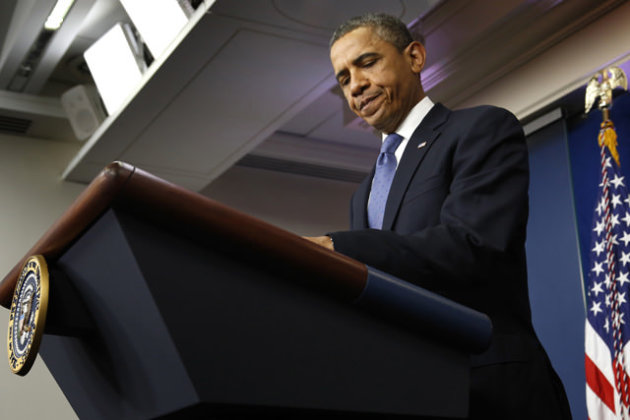By Richard Cowan and Roberta Rampton
WASHINGTON (Reuters) - The United States was on track to tumble over the "fiscal cliff" at midnight on Monday, at least for a day, as lawmakers held back from supporting an eleventh-hour plan from Senate leaders to avert severe tax increases and spending cuts.
The U.S. House of Representatives looked unlikely to vote on a Senate "fiscal cliff" plan before midnight, possibly pushing a legislative decision into New Year's Day, when financial markets will be closed.
The plan was heavy on tax increases and light on spending cuts, which was unlikely to appeal to Republicans in the House.
It would raise income taxes on high-income Americans, but leave taxes at current levels for the middle class, a key goal of President Barack Obama.
But there was discontent among Senate Democrats worried that the proposal did not go far enough in taxing the rich. The Democrats asked for a meeting with Vice President Joe Biden to have him explain the talks he was having with Republican Senate Minority Leader Mitch McConnell.
"The caucus as a whole is not sold" on the plan, said a Senate Democratic aide. "We just don't have the votes for it."
If Congress fails to act, about $600 billion in tax increases - much steeper than those in the Senate plan - and government-wide spending cuts will begin taking effect after midnight, harsh measures that could lead to a recession.
But lawmakers could still vote for a deal on New Year's Day or later and prevent the worst of the fiscal cliff effects.
The House expects to reconvene on Tuesday at noon, Republican Representative Steven LaTourette said. He added that House members had been told to stay close on Monday evening and that they may be called back to continue negotiations.
Under the Senate plan, income above $450,000 per household or $400,000 per individual would be taxed at 39.6 percent, up from 35 percent. Income up to those levels would be taxed at the current, reduced tax rates put in place under former President George W. Bush.
The Senate plan would raise estate taxes on inherited wealth and permanently fix the alternative minimum tax, or AMT, so that it did not threaten each year to sweep in millions of middle-income Americans for whom it was not intended.
The plan also postpones for two months the automatic, across-the-board spending cuts in defense and domestic programs that are part of the fiscal cliff, Senator John McCain said.
SENATE DEMOCRATS UNSURE
Some Senate Democrats did not like the $450,000 threshold for raising taxes on the rich - they wanted $250,000 - or the higher threshold for raising estate taxes. Democrats also are upset there is no agreement yet to put off the first round of $1.2 trillion in automatic spending cuts.
Republicans already are pushing for switching those across-the-board cuts to savings in the Medicare and Social Security healthcare and retirement programs and threatening to block a debt limit increase in February unless they get their way. But that is a fight that would most likely play out in January and February.
Some Senate Democrats aides were dispirited that Biden, a fellow Democrat, had gone further than they wanted in the fiscal cliff talks, just as he did in December 2010 when all Bush tax cuts were extended for two years.
Shortly after the plan emerged, Obama said agreement was within sight, but he sounded a cautious note.
"There are still issues to resolve, but we're hopeful that Congress can get it done, but it's not done," Obama, a Democrat, said at a White House event.
U.S. stocks rose on the day, with the market closing before the latest news broke about the House not voting. The benchmark Dow Jones industrial average closed up 1.3 percent at 13,104.
Even if the country tumbles over the cliff, legislative action afterward could soften the blow.
Final legislation can be backdated to January 1, for instance, said law firm K&L Gates partner Mary Burke Baker, who spent decades at the Internal Revenue Service.
"The important date is the date in the legislative language ... no matter what day the Senate or House pass the law, or the date the president signs it," she said.
Former Obama administration Treasury Department tax official Michael Mundaca agreed, although he said there would likely be delays in filing for many taxpayers as the IRS gets its computers into gear.
A deal on Tuesday will likely leave unsolved the issue of the "debt ceiling," which caps how much debt the federal government can hold.
Treasury Secretary Timothy Geithner said in a letter to congressional leaders that the government would suspend some investments in pension and health benefit funds for federal workers beginning on Monday in a move that allows it to keep borrowing for the meantime.
(Additional reporting by Mark Felsenthal, Tabassum Zakaria, Kim Dixon, Jeff Mason, Rachelle Younglai and David Morgan, Writing by Kevin Drawbaugh, Editing by Alistair Bell and Peter Cooney)



